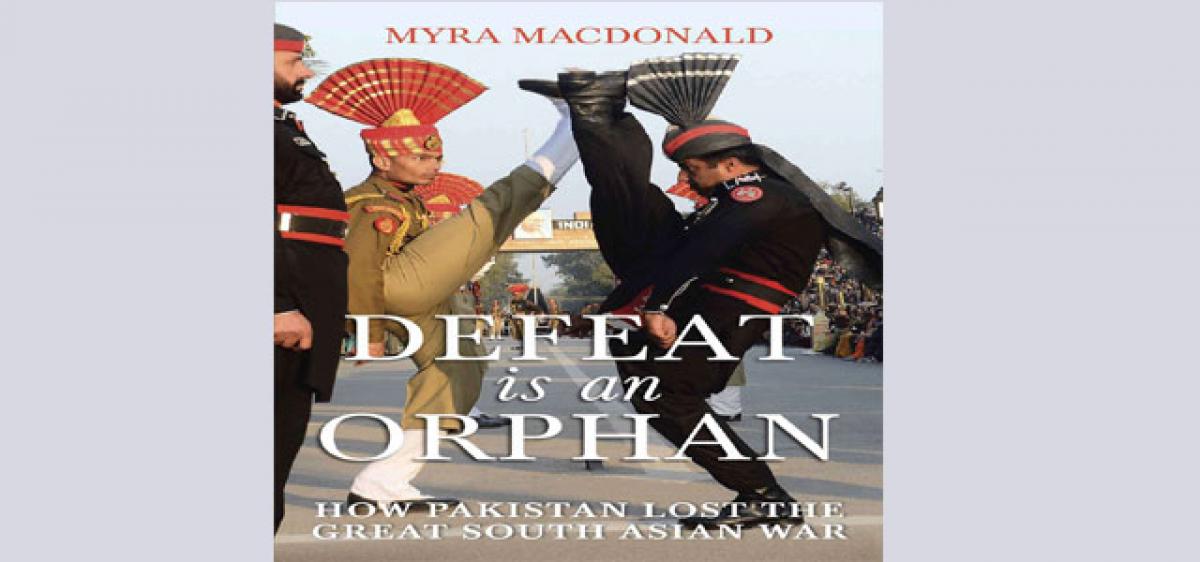Live
- Three persons admitted to hospital for diarrhea treatment
- First Star Outside Milky Way Captured: WOH G64 is 2,000 Times Larger Than the Sun
- Sikkim govt to constitute state Niti Ayog: CM Tamang
- CBI books Rajasthan narcotics inspector for Rs 3 lakh bribe
- Rajasthan bypolls: A tough contest between BJP and Congress
- Albania joins SEPA, paving way for EU integration
- Japanese government approves 250-billion USD economic package to ease price pain
- Six pharma companies to set up their units in Telangana
- The Unstable Events of a 17-Wicket Day in Perth: India vs Australia
- Dutch FM's Israel trip cancelled after Netanyahu's arrest warrant
Just In

The USA and USSR (erstwhile Russia) fought bitter cold war for nearly four decades. When it finally ended, it was said that the US did not won but the USSR lost.
The seven-decade-long conflict between India and Pakistan has changed its face in the last 20 years. Myra MacDonald’s book ‘Defeat is an Orphan’ talks about the dynamics of the Indo-Pak relations
The USA and USSR (erstwhile Russia) fought bitter cold war for nearly four decades. When it finally ended, it was said that the US did not won but the USSR lost.
The nearly seven decades war (proxy and direct) that is going on between India and Pakistan, has many parallels. Unlike the USA-USSR, India and Pakistan waged several battles, not counting the often skirmishes. While the root cause of the Indo-Pak conflict is ‘Apple orchard’, over the years, the form of war and its dynamics changed, despite socio-political conditions being more or less the same.
Journalist Myra MacDonald in her book ‘Defeat is an Orphan: How Pakistan Lost the Great South Asian War’ touches upon the milestones in the conflict and attempts to analyse the major happenings post nuclear tests both nations carried in 1998.
Having worked with Reuters in Delhi, she is no stranger to the events and banks on her reportage and research to bring out an exciting account on Indo-Pak relations and its dynamics in the past two decades.
Starting with hijack of Indian Airlines flight in Kathmandhu, McDonald not only narrates the incidents but dwells on the subsequent consequences on both nations and their respective dynamics with other nations in the world.
She argues that it was the hijack of flight in the backdrop of Taliban occupying Afghanistan, that brought the ongoing conflict between India and Pakistan on the forefront, as the both nations fought a war barely months ago in Kargil, which India won.
While narrating the milestones events, she emphasised on the strategic missteps of the Pakistan that allowed India to overtake its arch rival.
McDonald insists that nuclear tests in 1998 were a key moment for Pakistan, as it promised strategic parity for the first time with its much larger neighbour. Feeling safe under the nuclear blanket, Pakistan supported militant groups, to start militancy in Kashmir.
This move, McDonald says has eventually alienated the international community and undermined the country's domestic security
Over time, though, the Islamist groups that Pakistan encouraged became a dangerous liability. Furthermore, Pakistan's militarised society proved self-reinforcing, impeding the peace process with India and prompting destabilising military coups.
Indian interests, on the other hand, lay in improving relations with the international community (including a much warmer relationship with the US) and in growing its economy. To some degree, MacDonald explains, the rivalry became one-sided: "India had no need to win a war against Pakistan--Pakistan was doing enough damage to itself to lose the competition with its bigger neighbour it had once hoped to win."
Over the course of events, the writer comes to a conclusion that though the socio-political conditions surrounding the bone of contention remains the same, the relations of the nations with international community has changed significantly.

© 2024 Hyderabad Media House Limited/The Hans India. All rights reserved. Powered by hocalwire.com







